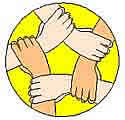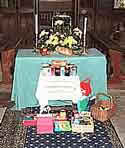 St Mary's Church, Dymock
St Mary's Church, Dymock
| Admin | |||
| . | Home | Contents | |
| H&S Policy | People Safety | Grave Yard | |
The Church & The World
Faith & Care
Faith & Care
Things Past
People & Features
People & Features
Seasons and Festivals

As well as the Seasons and Major Festivals which help us worship God, the church celebrates several 'Special Days' throughout the year to remember, honour and support each other and our work in God's world. Celebration of the "Special Days" is usually optional, Christians chose which they want to remember, not all churches celebrate all these days....
'Special Days'
| January | Plough Sunday | July | Sea Sunday |
| February | Education Sunday | August | |
| March | Mothering Sunday | September | Racial Justice Sunday Harvest Festival |
| April | Rogation | October | Disability Sunday Animal Welfare Sunday Hospital Sunday |
| May | Christian Aid Week | November | All Saints Day, All Souls Day Remembrance Sunday |
| June | Fathers Day Reader Sunday |
December | Nine Lessons and Carols Christingle Service |

Resolving Conflict: Whilst the large majority of ship owners treat their seafaring staff well, there is still a rogue minority that do not. Seafarers have been stranded on vessels in ports with no idea how long they'll be there. Some go for months with no pay, or not enough food and fresh water. In these situations, local representatives of the Mission to Seafarers work with ships' agents and other partners to bring resolution and comfort to crews.
Personal Support: Mission chaplains and staff visit seafarers on their ships to extend a hand of friendship and help in times of crisis. The Mission to Seafarers operates Seafarers’ Centres in over 100 ports. These are inviting places in the middle of dull, featureless docksides. Inside, crew members can make the most of their limited time ashore by replenishing essential items from the Mission's shops, celebrate Holy Communion and fellowship in the Mission's chapels and, crucially, use the Mission's telephones and computers to keep in touch with their loved ones thousands of miles away.
(Return to top)

Migration of people is now an established part of world globalisation, and this Special Day uses many of the references in the Bible concerning the migration of people in the past, as well as the diversity of peoples throughout the world. Racial Justice is an appropriate concern for Christians since Jesus himself prayed that we would all be one (John 17:22-23).

Harvest gifts at
the altar in
Dymock church
The full moon nearest the autumn equinox is called the 'Harvest Moon', so the ancient tradition was to celebrate the annual harvest on the Sunday nearest that moon, usually near the end of September but occasionally in early October. It should be no surprise, then, to learn that the word 'Harvest' comes from the Anglo-Saxon hArfest meaning 'Autumn'.
Several customs are associated with harvest. An early custom was to make a loaf of bread from the first wheat crop and offer it to God. This event was called Lammas, meaning 'Loaf Mass'. Another was to decorate the horse bringing in the last cart load of wheat with garlands of flowers and colourful ribbons. Also, it was not uncommon for the grateful farmer to put on a grand feast for the workers, often in the fields, when the harvest was completed.
The modern Service of Harvest Festival can be traced back to the Reverend Robert Hawker in Morwenstow, Cornwall who, in 1843, invited parishioners to a special harvest thanksgiving Service in church, where newly written Victorian hymns were sung, such as "We plough the fields and scatter the good seed on the land" and "All things bright and beautiful".
Today it's still common to decorate the church with some of the best of the harvest - fruit, wheat, bread, etc, and to sing the traditional harvest hymns. In rural churches, locally produced food is usually still used for the decoration but in suburban and town churches it's not uncommon to use tins and packets of food bought from the supermarket. Either way, the food so presented in church is then packaged up after the Service and offered to local people such as the elderly or homeless.
It's also common to maintain the old tradition of a feast after the harvest by having a meal for the congregation after the Harvest Service in church, known as the 'Harvest Supper' or 'Harvest Lunch' depending on the time of day it's held.
Whilst in the west we're not so reliant today on the vagaries of the weather, farmers are still affected by too little water, or too much, and sudden diseases such as Foot and Mouth or Potato Rot, so it's not unreasonable to give thanks to God for the harvest and to acknowledge his part in its successful outcome.
(Return to Top)